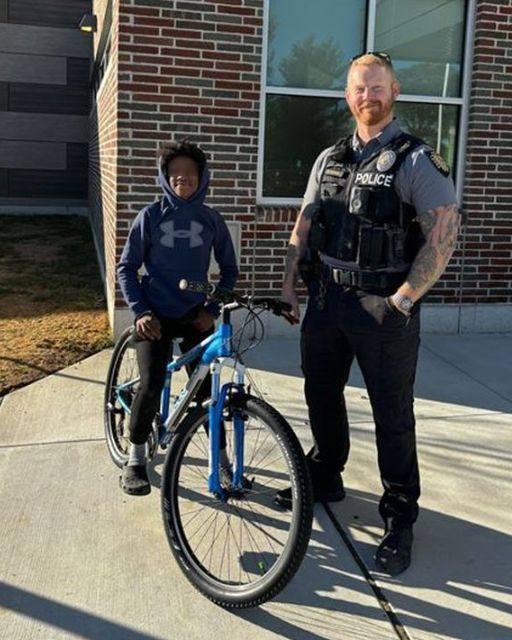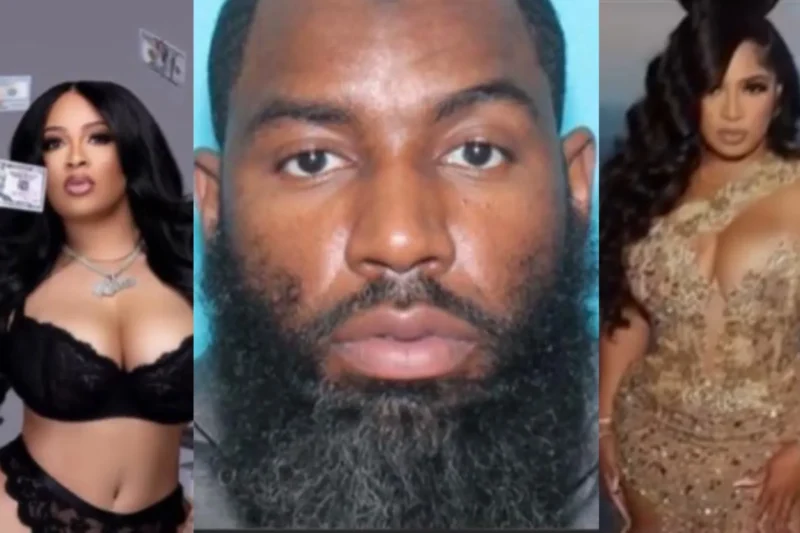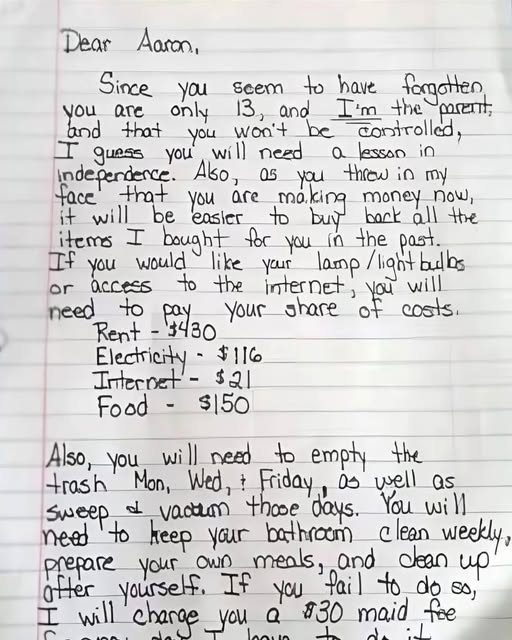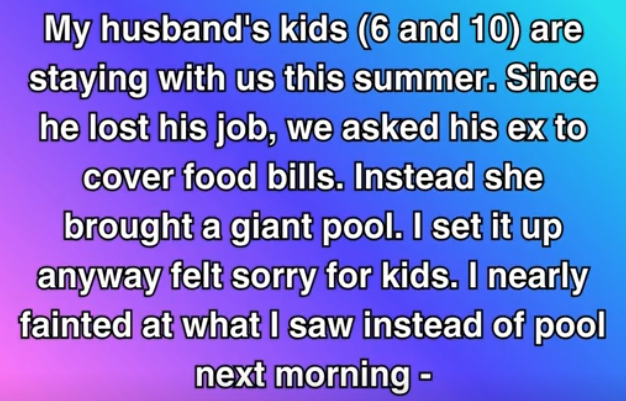I first noticed him a couple of weeks ago. Always the same routine—blue hoodie, quiet eyes, sitting on the front steps of the school well before the first bell. I’d drive past on patrol, and he’d give a small nod. Never caused any trouble. Just sat there on his bike, waiting.
One freezing morning—not a dramatic snowstorm, just cold enough to make your fingers stiff and your ears sting—there he was again, hands tucked into his sleeves, breath fogging in the chilly air.
I pulled up and leaned out of the cruiser window.
“Hey man,” I said. “You alright out here this early?”
He just shrugged. “I like the quiet.”
I didn’t press him, but something about that answer stuck with me.
The next day, I brought him a pair of hand warmers and handed them to him without a word. He smiled—barely—and nodded again. That was it. But the day after? He waited for me.
Eventually, I learned his story. His name was Cairo. He was twelve years old. Ever since his dad had to leave for work at 4:30 AM, he’d been biking to school early. He said it was better than “just listening to the walls.” Sometimes, the house got too loud even when no one was talking.
So I kept showing up too.
One morning, I brought him a thermos of cocoa. The next day, a spare helmet from the youth program.
But the day this picture was taken, he said something that really hit me.
He looked up from his bike and said, “You show up more than my dad ever did.”
I already knew that—it was one of the reasons I kept coming back.
Still, it wasn’t really my place. I was just the neighborhood patrol. I wasn’t his parent. But the way he sat there, so quiet and small, like he was bracing for life instead of living it—yeah, it got to me.
One day, I asked Cairo if he wanted to sit in the cruiser while we waited. Just to stay warm. He hesitated, then nodded. We didn’t talk much. Just sat. He liked country music, so I played a little. He didn’t say anything, but I saw him tapping his fingers on his knee.
A week later, he brought me a drawing. It was of my cruiser, parked in front of the school, with a stick figure inside wearing a hat. “That’s you,” he said. “You look serious.”
I laughed. “That’s ‘cause I’m always serious when I’m protecting schools from imaginary aliens.”
He smiled wider than I’d ever seen. It was the first real grin I got from him. I kept that drawing pinned to my dashboard.
But not everything stayed light.
One day, Cairo didn’t show up.
I waited ten minutes. Fifteen. Then twenty. Nothing. I checked with the school—they hadn’t seen him. I called dispatch and got permission to check his home, the address he’d mentioned once in passing.
The house looked worn. Curtains drawn, yard unkept. I knocked. No answer. Something felt off. I radioed for backup, just to be safe. When his dad finally opened the door, he looked exhausted, like he hadn’t slept in days.
“Cairo here?” I asked.
He blinked and looked over his shoulder. “He’s in his room. Just tired. Stayed home.”
I didn’t want to pry, but Cairo’s absence didn’t feel right. “Mind if I say hi? Just for a second?”
The dad hesitated, then nodded. I followed him through a hallway that smelled like old takeout and stale coffee. Cairo’s door was slightly open.
He was curled up on the bed, headphones on, eyes red. Not crying—but close.
He sat up when he saw me. “Sorry,” he mumbled. “Didn’t sleep.”
I crouched by the bed. “Everything okay, buddy?”
He nodded but then shook his head. “Dad got mad. Not at me. Just… loud again.”
His dad stood in the doorway, rubbing his neck. “It’s been tough,” he muttered. “Since his mom left, I’ve been working doubles. I’m trying.”
I didn’t judge. That wasn’t my job. But I looked him in the eye and said, “You’re not alone. There are people who can help.”
He nodded again, slower this time. “Yeah… maybe it’s time.”
That was the beginning of something.
A week later, Cairo started coming to a weekend youth program the precinct sponsored. Art classes, sports, mentoring. I showed up every Saturday, partly for him, partly because I enjoyed it.
He changed little by little. Still quiet, but less guarded. Started laughing more. He even made a couple of friends—Marcus and Javi. They called themselves “The Bike Squad” and rode everywhere together.
Cairo told me once, “It’s easier to breathe when you’re not alone.”
One Saturday, he showed up with a plastic bag and said, “I brought lunch for both of us. I made it.”
It was peanut butter and banana sandwiches, wrapped in foil. The bread was a little squished, but I swear it tasted better than anything I’d had in weeks.
By spring, he didn’t need to come early to school anymore. He still came early sometimes—but now it was to meet his friends, not to escape.
Then something unexpected happened.
At the end-of-year youth showcase, Cairo’s artwork was displayed. He had drawn a comic book story about a kid on a bike who fights off shadows with a flashlight given to him by “a patrol officer who always shows up.”
The last panel had a single sentence: Sometimes, showing up is the bravest thing someone can do.
There wasn’t a dry eye around his display.
A couple approached me and asked if they could sponsor Cairo for a local art summer camp. They were touched by his story. I told them I’d check with his dad.
When I brought it up at their house, his dad sat quietly for a moment. Then he said, “You know… maybe it’s time I showed up too. I’ve been trying to survive so hard, I forgot how to live.”
That hit me.
He agreed to the camp. Helped Cairo pack, even wrote a little note Cairo found on the first night. “Proud of you, son. Love you.”
Cairo came back glowing.
By fall, he was a different kid. Still Cairo—but now, he stood taller. He even joined the student council. Said he wanted to make school better for kids like him.
But here’s the twist I didn’t see coming.
One morning, a teacher stopped me in the hallway and said, “Cairo’s writing an essay about you.”
I blinked. “What?”
She smiled. “It’s for a contest—‘Someone Who Changed My Life.’ He picked you.”
I wasn’t sure how to feel. Honored, sure. But also humbled. I never did any of it for praise. I just showed up.
Cairo won second place. His essay was read at the district assembly. He stood on stage and said, “Sometimes, you don’t need someone to fix everything. You just need someone to be there when it’s hard to breathe.”
He looked right at me when he said that. And yeah, I teared up. No shame.
Now, Cairo’s in high school. He still visits the youth program. Still draws. His dad’s working fewer hours, trying to be present. They even came to the precinct holiday dinner together last year.
Cairo brought me a gift—his first printed comic book. He dedicated it to “the man who taught me how to be seen.”
I keep it on my desk at the station.
Not because I need the reminder—but because it reminds me what matters.
It’s easy to write people off when they’re quiet, when they show up early, or seem like they’re just hanging around. But sometimes, those are the people holding everything together with duct tape and hope.
Cairo didn’t need someone perfect. He just needed someone consistent.
And the truth is, we all need that.
If you’ve ever wondered if showing up matters—it does.
You might not fix everything. You might not have the right words. But your presence? It can be the difference between someone giving up and someone holding on.
So if you’re reading this, think about that kid at your school. That neighbor who always walks alone. That coworker who eats lunch at their desk. Maybe all they need is someone to show up.




